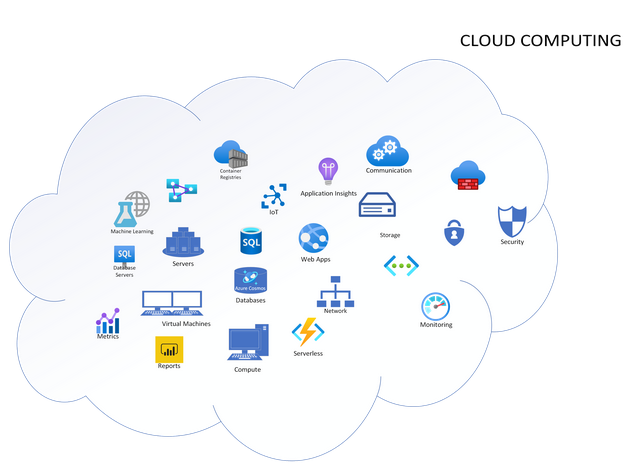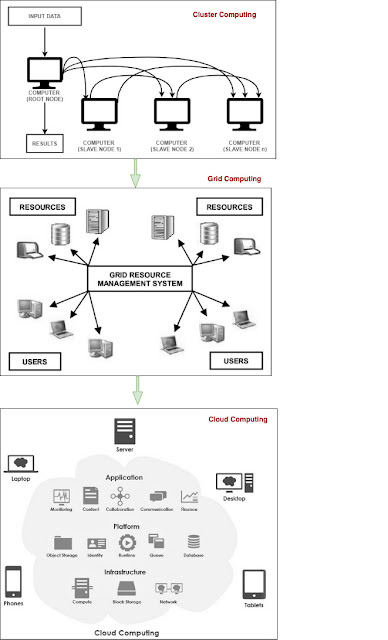Cloud computing is one technology innovations which delivers different computing services through the Internet, these different services are composed of the important resources like web servers, databases, data storage, virtual machines, applications, network infrastructure, security tools, software, and other IT infrastructure.
It is called cloud computing because all the data and information we need are being remotely stored and are accessed in a virtual space through the Internet.
 |
| Overview of cloud computing |
Cloud computing enables software developers or cloud engineers to create, build, test and deploy technical cloud solutions productively, effectively, and securely.
Instead of having our resources like the databases, applications, servers or infrastructure physical data centers or on-premise, we have these resources on the cloud or Internet.
Cloud Computing vs. Virtualization
Cloud Computing and virtualization both create useful virtual environments from abstract resources. In terms of cloud computing terminology - the cloud is an environment while virtualization is a technology.- Virtualization is type of technology that enables us to virtualize a hardware to create and simulate several machines or dedicated resources. On the other hand, the cloud is an IT environment that pools and share scalable resources across a network.
- Cloud environments are created to activate the great capabilities of cloud computing like running workloads within it.
- Cloud computing is a modern approach to provide on-demand resources for compute, storage, network, platform, web applications and infrastructure over the internet or cloud.
What is importance of Cloud Hypervisor in Cloud computing?
- Cloud Hypervisor is the Key to Virtualization in the Cloud. The powerful technology of hypervisor is emerging to be a vital tool in virtualizing resources and is driving modern innovation in the cloud environments.
- Hypervisors make resources and applications in the cloud available to its users remotely.
- The ability to access and manage cloud resources over the Internet gives organizations and IT better control in managing their systems, applications, data and infrastructure in the cloud environment.
- Virtualization technology simulates resources and environments from a single physical hardware system. The software behind this technology emulated called hypervisor has the capability to distribute a system into secure and distinct environments known as Virtual Machines (VMs).
 |
| Hypervisor Technology |
Cloud computing evolution
- Cluster computing(1980's) consists of tightly coupled computers (also known as Nodes) that work together to reach a single goal - to execute tasks.When multiple computers are clustered they share the computation tasks like a distributed system.
- Grid computing(1990's) is a subset of parallel and distributed computing in which clusters of computers and a loosely coupled computer performs a huge task. The computer systems that are on the grid in the same network work together and serves as a virtual supercomputer
- Cloud computing(2007-Present) has emerged as fifth-generation computing,one of the most amazing and impactful innovation in our history are modernization and digitization.
Different of Types of Cloud Computing Deployment Model
- The different cloud computing deployment models give us a descriptive overview of cloud computing platform in its different categories and parts.
- It also helps in identifying the important facts like who has access to it, how it is hosted and what is implemented.
- There are different types of cloud deployment models that are known - Public Cloud, Private Cloud , and Hybrid Cloud. There are also other deployment models such as Community Cloud and Multi-Clouds that have been trending and in demand these days.
Public cloud
- A deployment model where the cloud infrastructure is available to the public or any organization using or selling cloud services.
- A public cloud platform is a service provided by cloud provider like Microsoft for Azure, Google for GCP.
- Public Cloud Computing Providers : Microsoft Azure, Amazon (AWS), Google Cloud Platform, Oracle Cloud and Alibaba Cloud.
- Advantages of Public cloud
- Cost Effectiveness and Cost Management
- On-Demand Services and Portability
- Scalability and Reliability
- Sophisticated and modern solutions
- Flexibility in administration through self-service cloud management portals
- Monitoring, Analytics and Reports Visualization
- Resource Pooling
- Security and Privacy
- Disaster Recovery and Geo-location
Public cloud
Private Cloud:
- A cloud infrastructure that is operated and owned by one organization - on premise or off premise.
- An organization that is utilizing private clouds make use of the cloud computing technology with considerations to privacy and the importance of security.
- Organizations or institutions that have special requirements and IT policies that require enhanced security and control over the cloud infrastructure are commonly using private clouds.
- The infrastructure and its resources are managed on the organization’s private cloud on a virtual private network.
- The Advantages of using Private Cloud
- Enhanced privacy and security since resources are not shared with others
- Increased control over the infrastructure and owned resources
- Compliance to business-critical security and regulatory compliance requirements
- Flexibility to customize the environments based on the on-demand requirements of the organization or business
 |
| Private cloud |
Hybrid Cloud:
- A cloud infrastructure that is composed of multiple clouds, a combination of private, public.
- In hybrid clouds unique entities are kept but are bound together by standardized technology which allows portability of application and data. For example load-balancing between clouds through cloud bursting.
- The technique in application deployment in which an application is running in a on-premise data center or private cloud and bursts into a public cloud when the computing capacity demands arises.
Hybrid cloud
What is Multi-cloud ?
- Multicloud is one of the recent approaches in cloud engineering. As the word itself describes, it means implementing cloud solutions with several cloud providers.
- One of the huge advantages of multi-cloud strategy for organizations is preventing the risks of cloud vendor lock-ins and risk management.
Difference between Multi-cloud and Hybrid cloud ?
- Multi-cloud refers to the presence of more than 1 cloud deployment of the same type (public or private), sourced from different vendors, where as hybrid cloud refers to the presence of multiple deployment types (public or private) with some form of integration or orchestration between them.
- A multicloud approach could involve two public cloud environments or two private cloud environments. A hybrid cloud approach could involve a public cloud environment and a private cloud environment with infrastructure facilitating workload portability.
Cloud Computing Service Models
There are different cloud service models in the cloud. These are the Infrastructure as a Service (IaaS), Platform as a Service (PaaS), Software as a Service (SaaS).
Infrastructure as a Service (IaaS):
- It is a type of computing model where public cloud provider like Google(GCP), Microsoft(Azure) provides infrastructure as a service.
- Infrastructure like web servers, database servers, storage, networking and computing hardware are available to its uses on-demand.
- IaaS in the cloud allows its users to not worry about maintenance costs of having infrastructure on-promises. The cloud provider takes care of the maintenance, monitoring, security and loading balance.
Platform as a Service (PaaS):
- PaaS is a cloud service where the third-party vendor provides the hardware and software components to users to build application supporting platforms that they need to run on the cloud
- PaaS Providers - Salesforce PaaS, Red Hat OpenShift PaaS and Mendix PaaS
Software as a Service (SaaS):
- SaaS is a software on-demand cloud model, where the cloud service providers give the users access to a fully developed application created specifically for distribution.
- The software updates are rolled out for all users uniformly and organizations can use their own tools with the vendor provided application programming interfaces (APIs)
- SaaS Providers - SAP, Salesforce, Adobe, Google, Microsoft, many more.
Compare IaaS, PaaS, SaaS
 |
| Computing services overview |
Reference: Learning Microsoft Azure, By Jonah Carrio Andersson
-------==========--------




Cloud computing has become a vital part of the IT industry, and professionals with expertise in this field are in high demand. If you're based in Delhi and looking to enhance your career in cloud computing, you may want to consider taking a cloud computing course in Delhi.
ReplyDeleteYour article content is so informative and valuable on cloud computing, Thanks for posting. Anyone who want to the door of career in it courses, enroll now at Data science Training Institute in Jaipur
ReplyDeleteYour blog provides a deep dive into the topic of cloud computing with an importance on virtualization and deployment models, as well as service models. Thank you for covering this important tech topic! Cloud-based database services
ReplyDeleteYour blog took to me an altogether critical spot. It is a valuable and verifiable article to upgrade information. Gratitude for sharing an article like this.Computer Accessories Online Shopping
ReplyDeleteI found your article on cloud computing deployment models and service models quite informative. It's essential for businesses to understand the differences between on premise vs cloud based solutions, as this decision can significantly impact their operations and scalability. Your breakdown of the various models provides a valuable resource for those looking to make an informed choice in today's dynamic tech landscape.
ReplyDeleteCloud computing has undeniably transformed the way businesses operate in the digital age. By offering scalable, on-demand access to a vast array of resources and services over the internet, it has ushered in a new era of flexibility, efficiency, and innovation. Whether it's storing data, running applications, or even utilizing powerful machine learning algorithms. Their are some types of cloud computing: 1. Public Cloud: Public clouds are owned and operated by third-party service providers. 2. Private Cloud: Private clouds are dedicated to a specific organization. 3. Hybrid Cloud: Hybrid clouds combine both public and private cloud infrastructures.
ReplyDeleteVirtualization is a foundational technology in cloud computing that involves creating virtual instances of computing resources, such as servers, storage, and networks. This allows multiple virtual machines (VMs) to run on a single physical machine, optimizing resource utilization.I offer an online the best to help with dissertation service to the students at a cheap rate.
ReplyDeleteThe title "Cloud computing Virtualisation, Deployment Models and Service Models" provides a comprehensive overview of essential cloud computing concepts. Understanding these elements is crucial for businesses, much like how custom patches
ReplyDeletecan uniquely represent a brand's identity and values.
The blog is great thank you for this blog
ReplyDeleteSelenium Training
Cloud computing is evolving rapidly, and by 2025, trends like AI integration, edge computing, and serverless architectures will dominate. The article’s focus on virtualization, deployment models (public, private, hybrid, multi-cloud), and service models (IaaS, PaaS, SaaS) lays the groundwork for these advancements. Multi-cloud strategies and hybrid solutions will also grow, helping businesses avoid vendor lock-in and optimize costs. Staying ahead of these Cloud Computing Trends 2025 will be key for innovation and competitiveness.
ReplyDeleteThis article is so helpful. For anyone seeking alternatives to chemical treatments, consider this natural treatment for psoriasis. It's a trusted approach
ReplyDeleteTry our natural remedy for scalp psoriasis and feel the difference.
ReplyDeleteSay goodbye to itchy scalp with our scalp psoriasis treatment.
ReplyDeleteNice details thanks for sharing with us. Also get more info check out my site https://www.acticlegarden.com/
ReplyDeleteScalp psoriasis is a particular kind of psoriasis that affects the scalp, causing red, inflamed areas which can be covered with the appearance of silvery white scaling. Sometimes, burning and itching are also present, along with dry flakes of the condition. In extreme cases inflammation may damage hair follicles and lead to loss of hair. It isn't an easy one to treat because the scalp has a dense skin and may be sensitive. Tea tree oil along with apple cider vinegar can be a few natural remedies that can be utilized as a natural cure and are hoped to provide an effective
ReplyDeletepermanent solution for psoriasis . They may help soften the scalp and reduce symptoms, but their effectiveness varies on each individual
Cloud computing virtualization enhances efficiency, deployment models provide flexibility, and service models allow users to choose tailored solutions. Custom leather patches UK businesses can also streamline their operations using cloud-based solutions
ReplyDelete